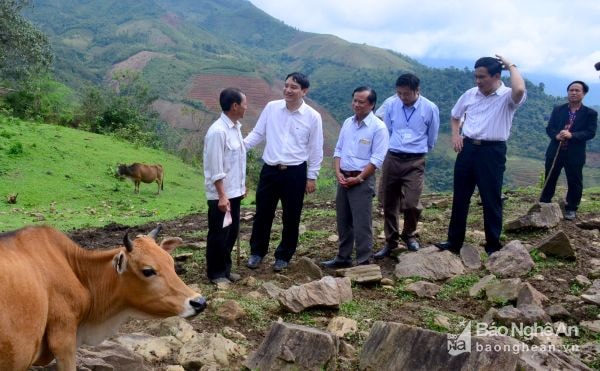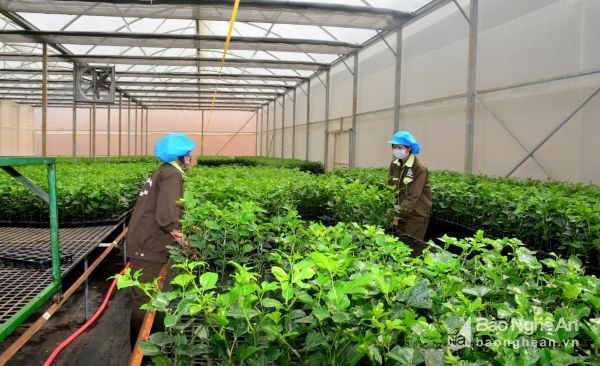Que Phong: Which direction to choose for development focus?
(Baonghean) - Among the advantages of Que Phong district, which core direction should be chosen to focus on investment to achieve the goal of rapid and sustainable poverty reduction? This is the issue raised and focused on analysis, dissection and clear orientation in the recent working session of comrade Nguyen Dac Vinh - Member of the Party Central Committee, Secretary of the Provincial Party Committee, Head of the National Assembly Delegation of the province in Que Phong.
» Provincial Party Secretary directs the reclamation of mineral mines
» Provincial Party Secretary visits the largest passion fruit seed production facility in Asia
Escape poverty from agriculture and forestry
The poverty reduction work of Que Phong district has been carried out in a relatively systematic manner and has its own way and approach; however, the poverty rate is still high, at nearly 46% by the end of 2016, and the economic scale is only ranked 18/21 districts, cities and towns in the province.
At the meeting of Provincial Party Secretary Nguyen Dac Vinh and the working delegation, opinions shared the same view: Agriculture and forestry are truly strengths and if implemented well, this is the opening for this locality to accelerate the pace of sustainable hunger eradication and poverty reduction. In recent years, Que Phong has been focusing on strong development in the direction of increasing production value in agriculture associated with restructuring the industry. The clearest evidence of Que Phong's success is widely known as the passion fruit development model.
 |
| Provincial Party Secretary Nguyen Dac Vinh visited the cow breeding model of Mr. Ly No Po, Tri Le commune, Que Phong district. Photo: Thanh Duy |
The delegation of the Provincial Party Secretary worked in Tri Le commune, Que Phong district. The previously deserted hills have been gradually replaced by vast passion fruit gardens, stretching far and wide, contributing to changing the lives of ethnic minorities in the border commune. Not only growing and selling passion fruit products, with the presence of businesses, a closed production chain for passion fruit has been gradually formed here.
Mr. Pham Duy Thai - Director of Nafoods Passion Fruit Joint Stock Company said: The company has invested 100 billion VND to build a high-tech passion fruit seed production center on an area of 5 hectares, combined with the previously built seed production facility, increasing the total area of the seed production complex to 6 hectares, which is considered the largest passion fruit seed production site in Asia with a capacity of 4 million seedlings/year.
This time, the company has started the construction of the Vietnam Passion Fruit Research and Development Center, which when completed will have a full system of research rooms to breed new varieties of passion fruit. Currently, the company is providing regular jobs for 300 workers, 90% of whom are local people. Impressed with the changes and ways of doing things in this borderland, the Provincial Party Secretary discussed with the company many issues, such as building a traffic system, creating jobs for local people to contribute to hunger eradication and poverty reduction...
Tri Le not only has a unique microclimate and red basalt soil for passion fruit trees to take root, but also has many endemic native plant and animal varieties with high competitive advantages. The Provincial Party Secretary and the working delegation visited the cattle breeding model of Mr. Ly No Po in Pa Khom village on an area of 20 hectares. With favorable natural conditions, Mr. Po has developed a herd of nearly 70 cows. If multiplied by the current market price, Mr. Po is truly a billionaire in cattle breeding in the border area. Naturally and honestly, Mr. Po introduced to the Provincial Party Secretary his family's production model as well as the difficulties encountered in household-scale production. Listening to the concerns of farmers in the border area, Provincial Party Secretary Nguyen Dac Vinh discussed and suggested to Mr. Po more about commodity-oriented livestock farming methods with in-depth investment.
 |
| Passion fruit seed production in Tri Le commune (Que Phong). Photo: Thanh Duy |
In conjunction with the restructuring of the agricultural sector, Que Phong district has had in-depth projects associated with the development of native plant and animal varieties deployed in many localities such as livestock development projects, passion fruit growing area planning of up to 1,500 hectares, safe vegetable production, etc.
The achievements and bright spots in Que Phong agriculture are recognized by everyone, but to achieve the desired results, there are still many issues that need to be solved.
Deputy Director of the Department of Agriculture and Rural Development Nguyen Tien Lam pointed out two bottlenecks in the district's agriculture and forestry that need to be resolved: planning, management and land use, and attracting businesses to invest in agriculture are still limited. Therefore, although the district is very concerned about building and replicating many models, it lacks the leading and connecting role of businesses to develop them into commodity-scale models.
Based on the analysis of Que Phong's strengths, in addition to developing industrial crops such as rubber and passion fruit on suitable cultivated land, maintaining and improving the efficiency of existing rice land to ensure food security, developing livestock farming in the direction of commodities, the Provincial Party Secretary pointed out that one of the important directions of this locality that needs to be effectively exploited is forestry. The whole district currently has an area of forestry land of more than 172,000 hectares, production forest of nearly 80,000 hectares, but there are still not many effective models of forest economic development.
Considering this as the advantage and core direction of the highland districts, including Que Phong, to be able to reduce poverty quickly and sustainably because it has an impact on the majority of people's lives, the Provincial Party Secretary suggested that the district coordinate with related sectors to develop forestry in the direction of providing raw materials for wood processing factories...
However, in the implementation process, the district needs to focus on attracting businesses to invest in this field so that they can play a leading role; at the same time, there must be a good forestry land planning strategy and land allocation to people for forestry work on the basis of specific and methodical calculations and analysis.
Building a team of qualified staff
The development orientation for Que Phong has been clearly indicated, but what the Provincial Party Secretary as well as many members of the working group are concerned about for this locality is building a team of qualified cadres to meet the requirements.
"Through monitoring and experience, it is shown that for mountainous and ethnic areas, although we invest a lot, if there is no quality ethnic cadre team at the grassroots level to implement, the efficiency will not be high," said Deputy Head of the Provincial Ethnic Minorities Committee Lo Xuan Vinh, thereby suggesting that Que Phong district continue to focus more on cadre work, especially ethnic minority cadres.
In addition to building the number of ethnic minority cadres to ensure the correct ratio according to regulations in district and commune-level agencies, it is necessary to have quality core cadres at the grassroots level. "How to build a cadre team among the people as the core of socio-economic development, then we can create real motivation", the Deputy Head of the Provincial Ethnic Minorities Committee proposed.
From the viewpoint, all changes must first come from the cadres, Provincial Party Secretary Nguyen Dac Vinh especially emphasized this issue during a meeting with the Standing Committee of Que Phong District Party Committee.
With the conditions of a poor district, a mountainous border area, the Provincial Party Secretary shared about the reality that the district has difficulty attracting good cadres from other regions, so the main solution is still to rely on the local cadre team as a whole, as well as attracting local children to be trained, continuing to train existing cadres. From there, building a "really good" cadre team in the direction of needing a certain number of cadres to be trained properly for development, but also needing a number of cadres to be stationed in the villages and communes who must be very knowledgeable about the locality, the area and have the courage to lead the masses.
“I suggest that comrades should study and build a political system in the direction that in important and key positions of the district, the best cadres should be selected to be deployed, trained, and trained to be the locomotives to promote development; and for positions in remote areas, comrades should choose people with courage, understanding of the locality, and close to the people,” the Provincial Party Secretary pointed out and suggested that Que Phong should do a good job of rotating cadres to the grassroots and training to prepare a source of key successor cadres; study to do a good job of describing job positions; and rearrange the apparatus for efficiency according to a forward-looking mindset.
| A new direction that Que Phong district will focus on exploiting in the coming time is tourism. The Secretary of Que Phong District Party Committee said that in the third quarter of 2017, the district organized a seminar on socio-economic development and eco-tourism and requested the Provincial People's Committee and the Department of Agriculture and Rural Development to support and create favorable conditions for the district to organize it successfully. The Secretary of the Provincial Party Committee agreed with the district's approach and suggested that the seminar would focus on analyzing the given orientations in more detail to have an effective development strategy. |
Thanh Duy
| RELATED NEWS |
|---|

